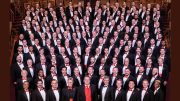By: Chris Azzopardi*/Special for TRT–
Pop star talks ‘novelty’ of his homosexuality, being an unfit role model and his peculiar sex toy
Remember the fuss Adam Lambert caused when he tongued his keyboardist in front of the world? Of course you do. The controversial kiss drew both homophobic outbursts and so-what shrugs, and it’s an American Music Awards moment that won’t soon be forgotten. Especially by Lambert himself.
“That was an interesting night,” he says, snickering in his charmingly guy-next-door way about that seminal smooch. “That AMAs performance was trespassing, in a way.” And, on his latest album, he’s not done crossing the line: Trespassing is the defiant second to the American Idol spawn’s 2009 debut.
In this candid interview with Lambert, the pop star opened up about the “redundant” press questions regarding his sexuality, becoming more confident as an out celebrity, and breaking the rules – and going to jail for it.
Q: What does the album title, Trespassing, mean to you?
A: Being who I am in this music environment is trespassing, and that’s why Pharrell (Williams) and I wrote it about that. We had a big conversation about the music industry and the business and being an artist, and then on top of it, being somebody that’s different, being a gay man and being in an industry where it’s not very common, not very present. Kind of feeling like I’m gonna own this, march forward and ignore any kind of sign or person telling me no. I’m gonna do what I wanna do and not feel sorry for myself.
Q: Is anything you do for shock value premeditated?
A: No; I don’t think, “OK, I want to piss people off now” or “I want to shock people.” I kind of, especially after the (AMAs), go with what I want to do musically. That’s been more in the forefront for me in my decision-making. I think just kind of being, and being unapologetic for being, is a risk in and of itself in today’s music industry.
Q: Was the AMAs kiss good for you?
A: I don’t even know. I was in such autopilot. It was one of those weird moments that just kind of happened. Some of the choreography earlier in the number was planned, but that whole moment with him was just, “Oh my god, now we’re kissing!”
Q: You’ve spoken with gay publications and mainstream publications. How is it different talking to each?
A: I try not to make it any different. That’s been one of my big goals, especially with this album. This time around I’m trying to just adopt a post-gay mentality about it, because I’m so proud of who I am and I’m 100 percent positive about it and I celebrate it – but I also think it’s a bit dated to harp on it and to lean on it and to constantly be defined by your sexuality. I think that gay men and women who live their lives as gay men and women understand that and understand that it’s just another part of who they are. Unfortunately, with some mainstream publications, it’s such a novelty for them to be able to talk about it. It’s such a hot-button issue that it becomes the focus of a lot of discussion.
Q: Does that bother you?
A: (Hesitates) It gets a bit redundant. Gets a little old. It’s something I’ve made peace with; I’m trying to just look at it from the other point of view and realize that a lot of the questions are legitimate for someone who doesn’t understand. I think the way to progress and confront ignorance is information. You start talking about things and we get past them. So yeah, it gets a bit redundant, but I feel like at this point, it just comes with the territory that I’m trespassing on.
Q: What challenges have you run into as not just an artist but a gay artist?
A: Well, there’s a huge double standard. Straight artists are constantly toying with images of sexuality and double entendre lyrics; when a gay male artist does, it raises a lot more eyebrows. I’m trying to find the balance, and I think this album has found a balance. It’s not shying away from it at all – my sexuality or who I am or my identity – but it’s also universal. All of these ideas are universal: how I feel, wanting to go get laid, to go have a couple drinks with my friends and get a little nasty. Hopefully, for an open-minded individual, no matter what their sexual preference is, they’ll relate. Everybody feels that way. Everybody wants to have a good time, let go and feel free, no matter who you are. What’s cool about the album is that it does specifically address my lifestyle and my experience in nightlife and in relationships, but I think it can reach anybody.
Q: Does being a gay celebrity put pressure on you to spearhead the gay movement? To have to be more political?
A: I don’t feel pressure to be political, but I do feel pressure to raise social awareness and to help be a confident voice for perhaps a young gay teenager who doesn’t really have a lot to look up to. I also find it dangerous, because I don’t always consider myself the best role model in the world. (Laughs)
Q: Why do you say that?
A: Because I’m not here to teach anybody how to be gay and I’m not here to teach anybody how to be the best person. I’m not always the best example. I make mistakes and I do things that are out-there sometimes, but what I hope to inspire is the sense that people can be who they want to be. I always say, “Don’t do what I do; do what you want to do.” I hope that I can inspire people to take control and charge of their own reality.
Q: What can we expect from this album?
A: One of the best parts about the album, as well as it being about an out and proud gay man, is that the first half of the album is very upbeat and electro-funk-dance-pop, and a lot of the things expressed in the first half of that album are rebelliousness and liberation and these kind of anthemic calls to arms. It explores, as gay men and people in general, that when we go out into the world we have to put on our game face. You want to go out and feel fierce, and that fierce thing that we all put on is sometimes like an outfit: We dress it up and we project fierceness, but what lies underneath is sometimes weakness and vulnerability and pain and darkness. The album transitions into that place midway through – it’s very dark and quite sad and it’s dealing with heartache and insecurity. It shows a lot about what lies underneath the surface of me, but I think we all can relate to that. We all want to be our fiercest self, and it takes a certain amount of posturing and peacocking to be that. I hope people can find themselves in this music.
Q: Tell me about the song “Outlaws of Love.”
A: That song actually is about everything – it’s about gay marriage, it’s about every challenge that we face as a community, including gay marriage, but it’s more about that emotion of what it feels like when you’re being persecuted or outlawed or shunned because of whom you choose to love.
Q: You’ve been reluctant to talk about politics in the past. But something seems to have changed in you; you’ve been more open to discussing politics and equal rights. What changed?
A: You know what I think? It’s so fast. All of a sudden everyone’s talking about me and I’m on the cover of a magazine. No matter how well-adjusted you are, that’s a weird thing to get used to. Over the past several years, with the first album and the first tour, I’ve got more comfortable in the public eye and I’ve gotten to know my fans more and I’ve sussed out who I want to be as an artist.
Q: But not just as an artist. As a gay man in the public eye too, right?
A: Yeah, as a person. Totally. I’ve kept a lot of my close friends close and my family is still close to me, but of course this type of experience and this flip in your lifestyle causes you to adjust – and that includes as a gay man. I’ve had to adjust and reassess things and evolve a little bit, and that’s because of age, too. When I started I was 27, and I just turned 30 – those three years are a big three years. My perspective is just different – it’s different because of celebrity, but also just because of life.
Q: What’s one piece of advice from American Idol that you’ve held onto?
A: I had a lot of support from my circle of friends who were like, “Just do what you’ve always done. It doesn’t matter that you’re on TV now; just do what you’ve always known.” The hardest thing about the show is all of a sudden, there’s all this pressure and all these factors that you aren’t used to as a performer, and you have to tune it out and just trust your own gut and try to maintain that sense of integrity. And it’s not easy. Then, transitioning into the music industry is the same challenge. You’re like, “OK, well, I gotta play the game but I also want to do what I want to do, so how do I do that?”
Q: You were in the slammer for a few hours for fighting with your boyfriend, Sauli Koskinen, outside a gay bar in Finland. Did it fulfill any fantasies of yours?
A: (Laughs) Uh, no. Actually, it was horrifying. I was by myself; there wasn’t anybody else in there. It was a private cell. It was a very embarrassing moment and not something that I’m proud of. I have plenty of friends who have had crazy nights and things have happened, and these things do happen to regular people; I am a regular person, but I just happen to have a higher profile. I’ve tried to walk away from the experience and learn a lesson from it and make some adjustments and try not to let it ever happen again. It definitely wasn’t as dramatic as the media made it out to be, but it also wasn’t something to laugh about.
Q: So it’s not true what they say about young guys in jail?
A: Not from my experience!
Q: What’s different about maintaining a relationship in the public eye versus out of it?
A: People wanting to know what’s up and asking questions. But I don’t know. To be honest with you, I only maintained one relationship out of the public eye, so I’m kind of inexperienced either way. (Laughs) I was a bachelor for a long time! I definitely played the field. So I think just being in a relationship that’s become quite domestic actually feels really good; it’s something I hadn’t really experienced much before, and I’m really enjoying it. It actually fits in quite well with my new lifestyle because it’s more private, it’s more at-home, and that’s nice.
Q: Do you want to be married and raise a family?
A: Yeah, someday. I definitely want that for myself at some point. I don’t know when that’s going to be. In fact, I don’t know if it’s anytime soon. I’m really excited that our society is progressing. Everybody has the divine right to marry whoever they fuck they want. The funny thing about being a gay celebrity is all of a sudden it’s like, “Oh, are you going to get married since that’s the new big struggle and that’s the thing everyone is fighting for?” And I’m like, “I can fight for it without getting married myself.” I don’t need to get married for my people. That’s silly.
Q: What does it take to be a Glambert?
A: Reckless abandon. (Laughs) I think that any sort of diehard fandom is a crazy, surreal mentality. That’s part of the fun for the Glamberts; they’ve given themselves permission within that community to be kind of insane. And it’s gorgeous and it’s fun and it’s an escape. It’s not real life – it’s something else. Everybody wants that in some form or another. We all have our different versions of it. For people who are diehard fans, that’s their way, that’s their obsession and that’s their outlet.
Q: Tell me your best crazed-fan story.
A: Well, I’ve gotten a lot of very interesting gifts. I don’t know what they’re called specifically, but I remember opening up this small box and it was this metal sex toy and I think you stick it in the tip of your penis – a urethra rod or something. I don’t know what the f#@k it is. (Laughs)
Q: Did you use it?
A: I definitely did not use that. That is not my style. I looked at it and said, “What the hell is that?” And somebody had to answer that for me and then I went, “OK, I’m gonna pass.”
Q: Did you at least re-gift it?
A: As a joke, I did. I think I gave it to Raja (season-three winner of RuPaul’s Drag Race). He actually was my makeup artist on my tour that same year. I think I gave it to him. I doubt that he kept it, but I know he laughed quite hard.
Q: Who knows where it is right now.
A: Or what it’s being used for!
*Chris Azzopardi is the editor of Q Syndicate, the international LGBT wire service. Reach him via his website at www.chris-azzopardi.com.








